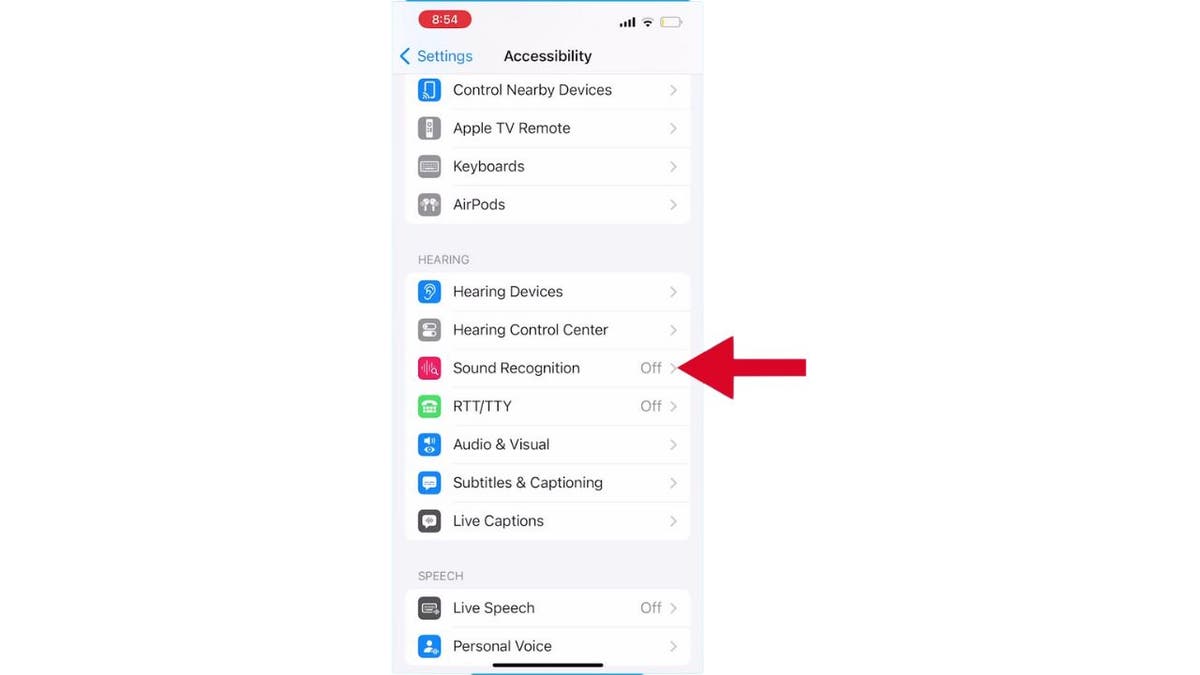Technology
iPhone’s little-known trick can hear better than some human ears
The iPhone is packed with features that you might take for granted. However, Apple has always prioritized accessibility, ensuring that people with physical challenges can enjoy the iPhone experience just like everyone else. One of the coolest accessibility features that can be used by anyone is Sound Recognition, and it’s something you might find incredibly useful.
GET SECURITY ALERTS, EXPERT TIPS – SIGN UP FOR KURT’S NEWSLETTER – THE CYBERGUY REPORT HERE
Sound Recognition on iPhone (Apple) (Kurt “CyberGuy” Knutsson)
Understanding Sound Recognition
The idea behind Sound Recognition is to allow your iPhone to listen for sounds you might not be able to hear if you are hearing impaired and alert you when those sounds are detected. As Apple describes it, “Sound Recognition uses on-device intelligence to notify users who might otherwise miss audible environmental alerts around them.”
When Sound Recognition is enabled, your iPhone will send you a push notification alerting you to the detected event, even if you lack the ability to hear it. While designed for the hard of hearing and hearing impaired, users without hearing problems can also benefit from this feature.
It’s important to note that Sound Recognition runs entirely locally on your iPhone. When the AI detects a sound, it identifies it right on your device – no uploading to the Internet is needed. This means Sound Recognition works without an Internet connection and keeps your alerts and Sound Recognition events completely private.

Sound Recognition on iPhone (Kurt “CyberGuy” Knutsson)
HOW TO PROTECT YOUR IPHONE, IPAD FROM MALWARE
Sounds iPhone can recognize
As of iOS 16, iPhone Sound Recognition can identify the following types of sounds: fire alarms, sirens, smoke alarms, cats, dogs, appliances, car horns, doorbells, door knocks, glass breaking, kettles, water running, baby crying, coughing and shouting.
Sounds iPhone can recognize (Kurt “CyberGuy” Knutsson)
8 GREAT IPHONE ACCESSIBILITY TIPS TO MAKE LIFE EASIER
How to use Sound Recognition on iPhone
Sound Recognition is not enabled by default, but it’s simple to turn it on. Keep in mind that you’ll need an iPhone running iOS 14 or later to use this feature. Here’s how to enable it to identify a door knock:
- Open the Settings app
- Tap Accessibility
- Under the Hearing header, tap Sound Recognition
Steps to use Sound Recognition on iPhone (Kurt “CyberGuy” Knutsson)
- On the Sound Recognition screen, toggle the switch to green (ON). Wait a moment for the required sound files to download
- Once the files are downloaded, tap the Sounds button
- On the Sounds screen, tap any sound you want your iPhone to recognize, such as Door Bell
Steps to use Sound Recognition on iPhone (Kurt “CyberGuy” Knutsson)
- On that sound’s screen, toggle the switch to green (ON) next to the types of sounds you want your iPhone to listen for
Steps to use Sound Recognition on iPhone (Kurt “CyberGuy” Knutsson)
After following these steps, your iPhone will continuously listen for the selected sounds and notify you when it detects them.
Sound Recognition on iPhone (Kurt “CyberGuy” Knutsson)
6 THINGS YOU SHOULD ABSOLUTELY DO IF YOU HAVE AN IPHONE
A word of caution
While Sound Recognition is a cool feature, Apple warns against relying on it in situations where you could be injured or killed. As stated on their website, “Don’t rely on your iPhone to recognize sounds in circumstances where you may be harmed or injured, in high-risk or emergency situations, or for navigation.”
SUBSCRIBE TO KURT’S YOUTUBE CHANNEL FOR QUICK VIDEO TIPS ON HOW TO WORK ALL OF YOUR TECH DEVICES
Kurt’s key takeaways
Apple’s commitment to accessibility is commendable, and the Sound Recognition feature is a prime example of how technology can be inclusive and empowering for all users. While designed with the hearing impaired in mind, Sound Recognition can be a handy tool for anyone who wants to stay alert to important sounds in their environment. By following the simple steps outlined in this article, you can unlock the power of this innovative feature and experience the iPhone in a whole new way.
What potential benefits do you see in the iPhone’s Sound Recognition feature for enhancing daily life or providing added security? Let us know by writing us at Cyberguy.com/Contact.
For more of my tech tips and security alerts, subscribe to my free CyberGuy Report Newsletter by heading to Cyberguy.com/Newsletter.
Ask Kurt a question or let us know what stories you’d like us to cover.
Follow Kurt on his social channels
Answers to the most asked CyberGuy questions:
Copyright 2024 CyberGuy.com. All rights reserved.